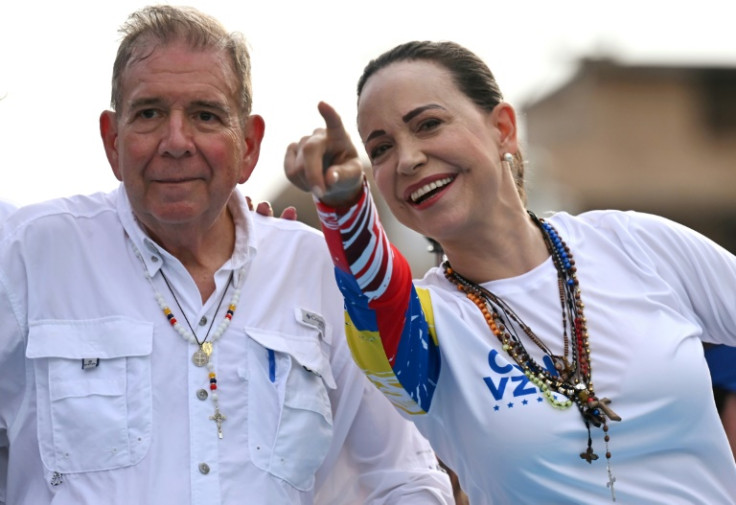Tense Venezuela Enters Final Day Of Election Campaign

A fraught election campaign closes Thursday in Venezuela, mired in uncertainty with President Nicolas Maduro having warned of a "bloodbath" if he loses -- which polls say is likely.
Maduro, seeking a third six-year term, trails far behind opposition candidate Edmundo Gonzalez Urrutia in stated voter intent, but observers and experts doubt he will give up power after Sunday's vote.
Maduro, in office since taking over from Hugo Chavez in 2013, counts the electoral authorities, military top brass and other state institutions among his backers. He also has enjoyed unlimited access to state media and funding for propaganda on everything from building facades to toll booth signage and even ambulances.
For the final day of campaigning, 61-year-old Maduro and Gonzalez Urrutia, 74, will both hold rallies in the capital Caracas amid a climate of nervousness about possible fraud in Sunday's vote and violence in the aftermath.
Maduro has urged supporters to march from one end of the capital to the other, ending in the city center.
Gonzalez Urrutia will campaign in a well-to-do neighborhood accompanied by wildly popular opposition leader Maria Corina Machado, who overwhelmingly won a primary vote last year but was barred from the race by institutions loyal to Maduro.
Last week, Maduro warned the vote's outcome would decide the future of the economically devastated country. The choice is "whether it becomes a peaceful Venezuela or a convulsed, violent and conflict-ridden Venezuela. Peace or war," he said.
Earlier, he said Venezuela risks a "bloodbath" if he loses to an opposition he described as "fascists."
The statement drew criticism from Brazil's President Luiz Inacio Lula da Silva, who said it "scared" him.
"Maduro has to learn: if you win, you stay. If you lose, you go," said the veteran politician.
Argentina's former president Alberto Fernandez echoed Lula's sentiment on Tuesday, after which Venezuela withdrew an invitation for him to observe Sunday's polling.
Maduro on Wednesday dismissed Lula's concerns, telling supporters: "He who is afraid should take a chamomile tea."
He insisted he was the only one who could "guarantee peace and tranquility," while reminding the nation the armed forces were on his side.
The rally, like the dozens of others Maduro has held countrywide, was broadcast live by state television, which has been a pillar of the incumbent's wall-to-wall campaign.
Gonzalez Urrutia, for his part, said Thursday: "They may have the resources of the state, they may have control of the CNE (electoral authority), they may have the prosecutor who applauds their abuses, but we have the love, the support and enthusiasm of the vast majority of Venezuelans who want change in peace."
Maduro's 2018 reelection was rejected as illegitimate by most Western and Latin American countries.
But years of tough sanctions and other pressure failed to dislodge the president, who enjoys support from a system of political patronage as well as from Cuba, Russia and China.
The formerly rich petro-state has seen GDP fall by 80 percent in less than a decade on his watch, driving some seven million of its citizens to flee -- adding to migration pressure on the United States.
Most Venezuelans live on just a few dollars a month, with the health care and education systems in total disrepair, and biting shortages of electricity and fuel.
The government blames US sanctions for the state of affairs, but observers say the collapse of the country's all-important oil industry was mainly the result of deep-rooted corruption and mismanagement.
Chile's leftist President Gabriel Boric on Thursday urged "transparent, competitive" elections.
Last week, Venezuelan rights group Foro Penal reported 102 arrests this year of people linked to the opposition campaign, adding to more than 270 "political prisoners" in the country.
Some 21 million Venezuelans are eligible to vote.
Caracas has withdrawn an invitation to European Union experts to observe the vote, while allowing monitors from the UN and the US-based Carter Center.


© Copyright AFP 2024. All rights reserved.





















